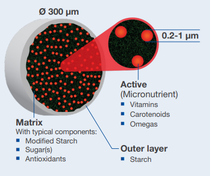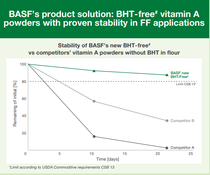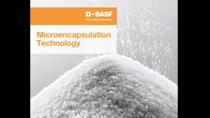Food Fortification
Protecting vitamins through microencapsulation

Authors: Claus Soendergaard, Global Application Specialist Food Fortification & Technical Marketing, BASF A/S, Ballerup, Denmark, and Jai Kumar Mishra, Regulatory & External Affairs (South Asia), BASF India Limited
To ensure an adequate supply of vitamins in the diet, the fortification of staple foods is standard practice in many countries. While fortification helps to improve nutritional value, which is especially important for low-income population groups, it also represents an investment in the future by contributing to healthier societies in developing and emerging countries. Successful food fortification requires the careful selection of the right vitamins and high-quality products that are suitable for use in staple foods.
Vitamins are sensitive to heat, light and oxygen, and need special protection to maintain their biopotency and health benefits. This is achieved with a technology called “microencapsulation.”
BASF specializes in the microencapsulation of vitamins, which it carries out at its production facilities in Ballerup, Denmark. The company has developed a unique microencapsulation method for the vitamin A and D powders used in flour and sugar fortification, which delivers best-in-class stability.
Ultimately, this technology benefits both consumers and flour and sugar producers, who obtain vitamin products with a longer shelf life. Moreover, vitamin microencapsulation improves the characteristics of vitamin powders during the fortification process, such as dust reduction and improved flowability. Thanks to the multiple benefits it offers, microencapsulation is highly sought after by producers of fortified staple foods and the global food, beverage and pharmaceutical industries, where microencapsulated vitamins are also used.
Advantages of microencapsulation technology
During microencapsulation, vitamins are embedded in a matrix of food ingredients such as starch, sugar, and antioxidants. This creates micro-sized, round vitamin particles called “beadlets.” Packed in this way, vitamins are better protected and less sensitive to heat, light, and oxygen, which results in a longer shelf life and more cost-efficient dosing.
The microencapsulation technology allows us to deliver the highest quality ingredients in the end consumer product.

Vitamins are protected inside a capsule made of starch, sugar and antioxidants and an outer layer of starch (Source: BASF)
Another important factor in improving the stability of vitamins is selecting the right antioxidant to be used in formulations. To date, the industry has used a synthetic food additive called butylated hydroxytoluene (BHT) to stabilize vitamins. Recently, BASF has developed BHT-free vitamin A for the fortification of flour and sugar. It is a vitamin A palmitate powder that can be applied either directly or through pre-mixes. Technical studies show the superior stability of this BHT-free vitamin A powder compared to other BHT-free vitamin A powders on the market, as shown in the graph below:

How is vitamin A microencapsulated?
Microencapsulating vitamin A is a multi-step technology. The vitamin A droplets are emulsified in water and stabilized to maintain a homogenous emulsion and prevent the components from separating. The mixture also contains antioxidants to protect against oxidation. In the next step, the drying phase, the emulsion is slowly sprayed into a current of air. This reduces the water content to a few percent and the droplets form microcapsules. At the same time, starch is added to build an outer layer on the microcapsules and provide the necessary flowability. After this drying step, the vitamins are called “beadlets.” Each beadlet contains vitamin A in a liquid droplet surrounded by a solid matrix of carbohydrates and antioxidant carbohydrates, protecting it from heat, light, and oxygen.
Why are microencapsulated vitamins an excellent choice for Indian producers?
India is an international powerhouse for the manufacture of nutritional consumer goods and there is high domestic demand for fortified staple foods, functional foods and beverages, and dietary supplements. Both domestic consumption and the export market require a continuous, reliable supply of vitamins and other health ingredients. The production of high-quality vitamin powders in particular requires specific microencapsulation technology that is not available domestically. High-quality vitamin powders are manufactured and supplied for the Indian market, for pre-mixes, fortified staple foods, and other nutritional applications.
Microencapsulated vitamins offer excellent purity, stability, and performance, and are GMP and FSSC 22000 certified. Its products are delivered to all regions and major countries using professional supply chain and logistics management. With its innovative solutions and modern technologies, BASF helps its customers to increase the profitability of their business and to offer products that contribute to sustainable development.
Want to learn more about our microencapsulation technology? Find out in the video!
